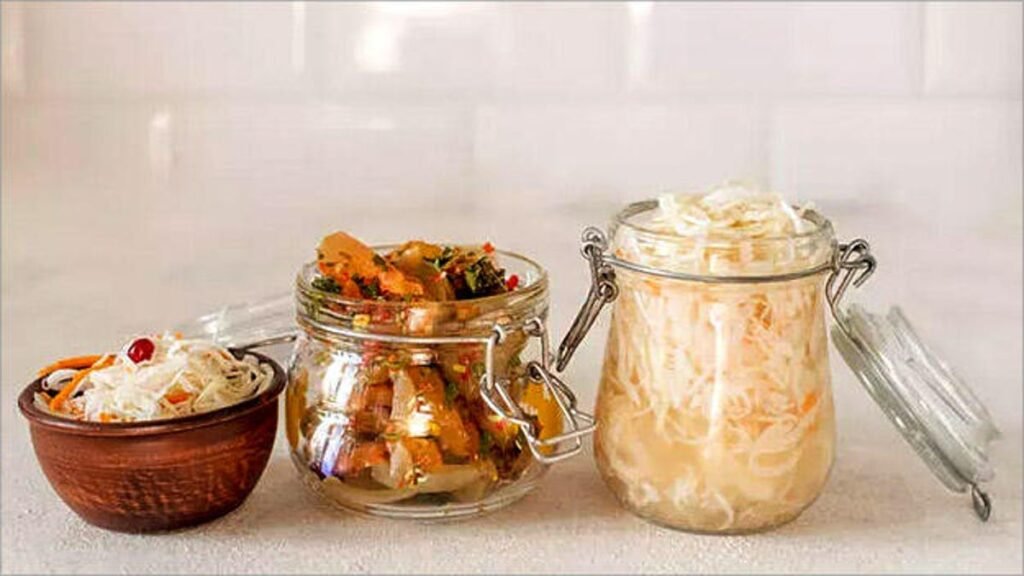If you’re aiming for a healthy gut, it’s essential to maintain a balanced microbiome—the community of microorganisms living in your intestines. While you can use probiotic supplements to achieve this balance, there’s an easier and more cost-effective option: getting probiotics naturally from the foods you already eat.
“Probiotics are live microorganisms, often referred to as ‘good bacteria,’ that help maintain a healthy balance in the gut by promoting the growth of beneficial bacteria and inhibiting harmful bacteria,” explains Gillean Barkyoumb, a registered dietitian and nutrition expert at Plexus Worldwide.
Probiotics can be found in a variety of fermented foods, such as yogurt, kefir, and sauerkraut, or you can opt for dietary supplements. Consuming probiotics regularly not only aids digestion but also enhances the immune system and supports mental health and overall well-being.
Benefits of Probiotics for Gut Health
Probiotics help with more than just digestive health. They can also reduce depression, improve mental well-being, support heart health, strengthen your immune system, and even give your skin a healthy glow. Additionally, maintaining beneficial gut bacteria can promote a healthy metabolism, reducing the risk of conditions like obesity and diabetes.
If you want to naturally boost your gut health, here are 12 of the best probiotic foods to include in your diet.
1. Yogurt: A Probiotic Powerhouse
For a convenient source of probiotics, yogurt is one of the best options. Choose yogurt that contains live and active cultures, particularly those that contain Lactobacillus acidophilus, which helps increase the number of good bacteria in your gut. It’s a delicious and widely available way to improve your gut health.
2. Kimchi: A Spicy Probiotic Boost
This traditional Korean dish made from fermented vegetables is loaded with probiotics. Kimchi is rich in lactic acid bacteria and provides various health benefits, including anti-aging, immune health, and even potential cancer-fighting properties. You’ll get both flavor and a probiotic punch with this fermented favorite.
3. Sourdough: Gut-Friendly Bread
Made with a natural fermentation process, sourdough bread contains lactic acid bacteria that serve as natural prebiotics and probiotics. Studies suggest that sourdough bread can help with blood sugar control, cholesterol, and weight management.
4. Kefir: More Probiotics Than Yogurt
Kefir is a fermented dairy drink that contains more probiotics than yogurt. It’s made by adding kefir grains to milk, which then ferments into a tangy beverage rich in probiotics. This makes kefir a potent drink for improving your gut flora.
5. Kombucha: Fermented Tea for Gut Health
Kombucha is a popular fermented tea packed with probiotics. It’s created by fermenting tea with bacteria, yeast, and sugar, resulting in a drink that’s great for digestive health. Kombucha also offers other benefits, such as detoxifying the liver and improving immune function.
6. Sauerkraut: Probiotic-Rich Fermented Cabbage
Another fermented favorite, sauerkraut is made by fermenting cabbage in saltwater. To ensure you get the probiotic benefits, look for raw sauerkraut or make it at home. Many store-bought varieties are pasteurized, which kills off the good bacteria.
7. Miso Soup: A Probiotic-Rich Japanese Staple
Miso, made from fermented soybeans, is a common ingredient in Japanese cuisine, especially in miso soup. Thanks to the fermentation process, miso is rich in probiotics that benefit your digestive system. It’s a flavorful and healthy addition to any meal.
8. Apple Cider Vinegar: Probiotic Benefits in a Bottle
Apple cider vinegar is created by fermenting apple juice twice, and it contains natural probiotics. This vinegar is known for a wide range of health benefits, including aiding digestion and weight loss. Use it in salad dressings or drink it diluted with water.
9. Aged Cheese: Delicious and Full of Probiotics
Certain aged cheeses like Cheddar, Gouda, and Swiss contain probiotics, particularly if they are not pasteurized. These probiotic-rich cheeses are an excellent way to enhance gut health while enjoying a tasty snack.
10. Pickled Vegetables: Fermented Veggies for Gut Health
Pickled vegetables, especially when lacto-fermented, are great sources of probiotics. Be sure to check the label to ensure the pickles contain live cultures, as many commercially available varieties are not fermented.
11. Buttermilk: A Traditional Probiotic Drink
Traditional buttermilk—the leftover liquid from making butter—contains natural probiotics. Avoid cultured buttermilk, which is the most common type sold in stores, as it usually lacks probiotics.
12. Tempeh: A Protein-Packed Probiotic
Tempeh is a fermented soybean product that originated in Indonesia. Rich in probiotics and protein, tempeh is a healthy meat alternative that supports gut health.
Final Thoughts on Probiotic Foods for Gut Health
Incorporating these probiotic foods into your diet can have a significant impact on your overall health. Not only do they help maintain a healthy gut, but they also offer benefits for your heart, immune system, and mental well-being. If you’re considering making changes to your diet to boost your gut health, always consult with a healthcare professional first.
